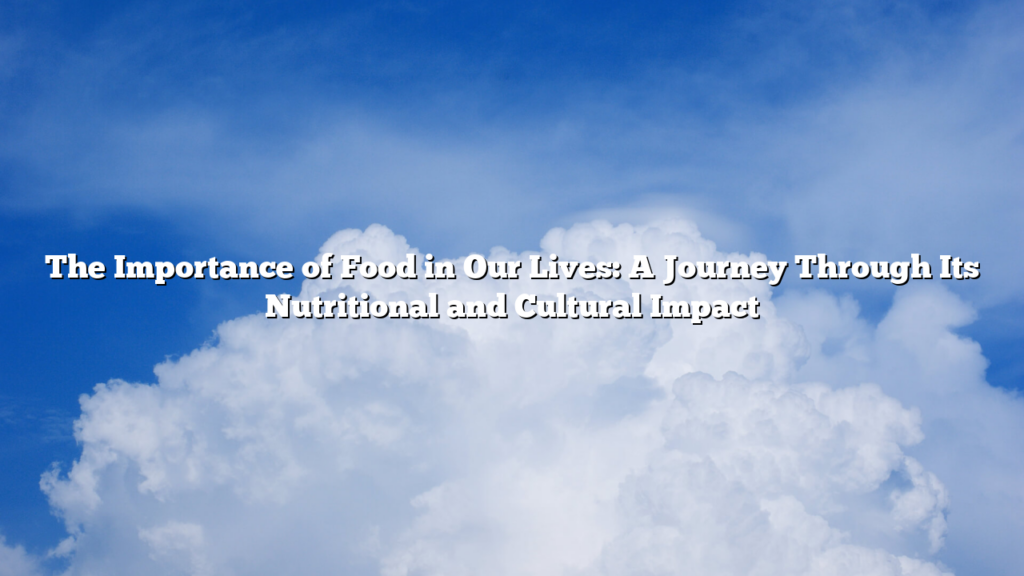
The Importance of Food in Our Lives: A Journey Through Its Nutritional and Cultural Impact
Food is more than just fuel for our bodies; it is a central part of human culture, history, and
tradition. The choices we make about what to eat are influenced by a combination of
nutritional knowledge, cultural practices, economic factors, and personal preferences. In this
article, we will explore the importance of food from several angles, focusing on its role in
nutrition, health, culture, and the global food system.
Food and Nutrition: Fuel for the Body
The primary function of food is to provide nutrients that our bodies need to survive and
thrive. There are six major classes of nutrients: carbohydrates, proteins, fats, vitamins,
minerals, and water. Each plays a crucial role in maintaining bodily functions, promoting
growth, and preventing disease.
Carbohydrates are the body’s main source of energy. Found in foods like bread, rice, pasta,
fruits, and vegetables, carbohydrates are broken down into glucose, which the body uses for
energy. While there are dewaslot69 link and complex carbohydrates, the latter, found in whole
grains and vegetables, provide more sustained energy and fiber, which is essential for
digestive health.
Proteins are essential for tissue growth and repair. They are composed of amino acids,
some of which are essential, meaning the body cannot produce them and they must be
obtained through diet. Good sources of protein include meat, fish, eggs, legumes, and nuts.
Fats are necessary for energy storage and supporting cell structure. While fats often get a
bad reputation, they are crucial for absorbing fat-soluble vitamins (A, D, E, and K) and
maintaining healthy skin and hair. Unsaturated fats, found in olive oil, avocados, and nuts,
are beneficial, while trans fats and saturated fats, found in processed foods and fatty meats,
should be consumed in moderation.
Vitamins and minerals are vital for various body functions. For instance, vitamin C is crucial
for immune function, while calcium is needed for strong bones and teeth. A balanced diet
rich in fruits, vegetables, dairy products, and lean meats typically provides an adequate
supply of these nutrients.
Water, often overlooked, is perhaps the most important nutrient. It helps regulate body
temperature, aids digestion, and keeps cells hydrated. Drinking enough water is essential for
overall health and well-being.
A balanced diet that includes all of these nutrients helps maintain energy levels, improve
mood, enhance cognitive function, and support immune health. A lack of any of these
essential nutrients can lead to deficiencies, which may manifest as conditions like anemia,
scurvy, or osteoporosis.
The Role of Food in Culture and Tradition
Food is deeply embedded in cultural identity. Different cuisines around the world reflect the
geography, climate, history, and values of the people who create them. From Italian pasta
dishes to Japanese sushi, food connects individuals to their cultural roots and often plays a
central role in rituals and celebrations.
In many cultures, food is used to mark significant life events. Weddings, birthdays, and
holidays are often celebrated with special meals or dishes passed down through
generations. For example, Thanksgiving in the United States is synonymous with turkey,
stuffing, and pumpkin pie, while in many Middle Eastern countries, meals like couscous and
lamb are shared during religious observances.
Food also plays a role in fostering community. Sharing a meal is a universal gesture of
hospitality, and in many cultures, eating together is an important social activity. It strengthens
family bonds and helps build connections among friends and neighbors.
Food and Health: Eating for Wellness
The relationship between food and health is more significant than ever. With rising concerns
over chronic diseases such as obesity, diabetes, and heart disease, people are becoming
more aware of the impact of their food choices on their health.
In recent years, there has been a shift towards healthier eating habits, such as plant-based
diets, organic foods, and more conscious eating. Plant-based diets, which emphasize fruits,
vegetables, legumes, and whole grains, have been shown to reduce the risk of chronic
diseases like heart disease, diabetes, and certain cancers. Similarly, reducing processed
foods and sugar intake can help maintain a healthy weight and support metabolic health.
Moreover, the growing interest in gut health has sparked a demand for fermented foods like
yogurt, kimchi, and kombucha. These foods contain beneficial probiotics that support the
microbiome, which plays a crucial role in digestion, immunity, and even mental health.
The importance of food goes beyond just avoiding illness. It also contributes to mental and
emotional well-being. Nutrient-dense foods, such as leafy greens, berries, and omega-3-rich
fish, have been linked to improved mood and cognitive function. Research suggests that a
healthy diet can reduce the risk of depression, anxiety, and cognitive decline.
The Global Food System: Sustainability and Ethical Considerations
The way we produce, distribute, and consume food has significant implications for the
environment and society. Modern agriculture relies heavily on monocultures, chemical
fertilizers, and pesticides, which can harm the environment. Deforestation, water usage, and
greenhouse gas emissions are also major concerns in food production.
In response, many people are turning to sustainable practices such as organic farming, local
sourcing, and reducing food waste. Organic farming avoids synthetic pesticides and
fertilizers, opting for natural methods to protect crops and promote soil health. Supporting
local farmers and purchasing locally grown produce not only reduces the carbon footprint but
also strengthens local economies.
Food waste is another pressing issue. According to the United Nations, one-third of all food
produced globally is lost or wasted. This not only wastes resources but also contributes to
food insecurity. Efforts to reduce food waste through better storage, distribution, and
consumption practices are crucial for creating a more sustainable food system.
Ethical considerations also play a significant role in food choices. Animal rights advocates
highlight the importance of ethical farming practices, promoting the welfare of animals and
encouraging plant-based alternatives. Moreover, the global demand for food has led to
exploitation in some areas, with workers in the agricultural and food production sectors often
facing poor working conditions.
Conclusion
Food is far more than sustenance. It is a cornerstone of culture, health, and community,
influencing how we live, interact, and thrive. Our food choices shape our health, impact the
environment, and connect us to traditions and people across the globe. By making mindful
decisions about what we eat, we can promote better health, respect cultural diversity, and
contribute to a more sustainable food system. In the end, food nourishes not only our bodies
but also our minds, relationships, and the world at large.



